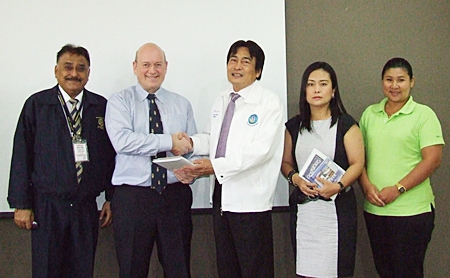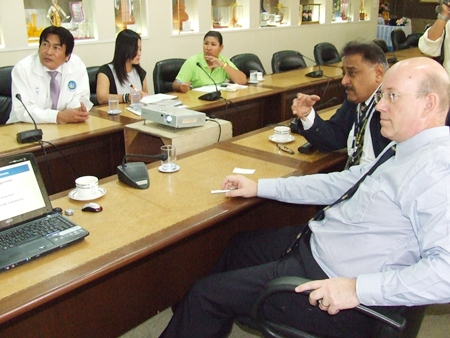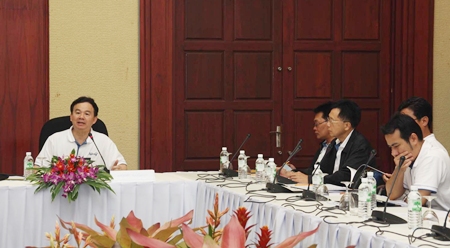|
BCCT to help woo back western tourists
and investments to Pattaya

Deputy Mayor Ronakit Ekasingh
(center) presents DVDs and information material about Pattaya City to Graham
Macdonald as Peter Malhotra (left), Rungratree Thongsai (2nd right) and
Pilipda Kingchan (right) look on.
A Special Correspondent
Following on from discussions at the British Chamber of
Commerce Thailand (BCCT) Eastern Seaboard Group meeting, Graham Macdonald,
chairman of BCCT and Peter Malhotra, MD of Pattaya Mail, met with Deputy
Mayor Ronakit Ekasingh last week to discuss how the BCCT can help the city
and the rest of the Eastern Seaboard attract more western tourists and
investment.

Deputy Mayor Ronakit Ekasingh
(left) views a presentation on the West’s view of the kingdom and statistics
on the decline of western holiday makers and new investors, presented by
Peter Malhotra (2nd right), MD of Pattaya Mail, and Graham Macdonald
(right), chairman of BCCT.
After a presentation which explained how the west viewed
the kingdom at the moment along with statistics on the decline of western
holiday makers and new investors, the deputy mayor and his staff debated on
how best to use this information.
The deputy mayor admitted he was not aware that the
United Kingdom invested so much in the Eastern Seaboard and was impressed
with the commitment of such companies as Boots, Tesco, GKN, Reckitt
Benckiser, Rolls Royce, et. al. He also agreed that there was a need to
attract more short and long term westerners to the city and local region.
Attending the meeting were Pilipda Kingchan, Assistant
Foreign Affairs Officer of City Hall and Rungratree Thongsai, Public
Relations Technical officer at Pattaya City Hall.
Another meeting has been scheduled for next month so these ideas can be
presented to local businessmen and discussed further before devising how to
take things further.
|
|
 |
9 banks to offer 0% loans,
as NIA seeks to increase industry innovation

NIA Director Supachai Lorlowhakarn
(left) announces the new 0% financing program.
Patcharapol Panrak
Hoping to spur innovation in Thai companies, nine banks will
offer zero-interest loans for programs that take advantage of information
technology, marketing and finance consulting from the National Innovation
Agency.
The NIA, set up in 2003 as an autonomous organization under
the Ministry of Science and Technology to address “the country’s declining
ranking in the global technology capacity sweepstakes,” reviewed its latest
effort to improve the competitiveness of Thai industries at a June 20 workshop
at Nong Nooch Tropical Garden.
NIA Director Supachai Lorlowhakarn said many Thai business
executives still lack technical and management skills, resulting in limited
development of unique products and services in the Thai economy. Following its
mission to facilitate cooperation between government, academia and the private
sector, the organization is reaching out to banks to provide funding for
corporate research and development projects.
Participating in the proposed 0 percent loan would be
Ayutthaya, Bangkok, CMB, Kasikorn, Krung Thai, Siam City, Siam Commercial, and
Thai Military banks, as well as the Small- & Medium-Size Enterprise Development
Bank of Thailand. The loans would support companies “interested in developing
innovative businesses” who require support from the NIA, Supachai said.
While the NIA would arrange consulting services, the banks
would also create promotional activities, such as workshops, to potential
customers and advise on the development of R&D projects.
The NIA already has a list of 10 proposed projects and is
encouraging banks to provide financing for efforts increase the knowledge
exchange and project management.
|

|
Bangkok Airways closes city check-in counter at Makkasan
Domestic carrier Bangkok Airways closed its check-in
service at Bangkok’s City Air Terminal, also known as Makkasan Station.
Airline public relations director Nantika Worawan said the service is closed
temporarily, as few passengers use the facility on average per day.
Bangkok Airways initially expected some 400 passengers would check in at the
City Air Terminal, or about 20 percent of approximately 2,000 travelers
using the carrier at Suvarnabhumi Airport. The figure expected was later
lowered to 20-50 passengers per day. Nantika said such low
numbers were due to the fact that it was more practical and convenient for
travelers to take a taxi directly to the airport. She said
the carrier will re-open its counter when the government attracts more
riders to use the Makkasan Station service, which may be positively affected
by providing added convenience in travelling, and building a department
store within the compound. Meanwhile, Thai Airways
International (THAI) continues to offer its city check-in service, but the
number of counters was reduced from four to one, for only about 15
passengers use the facility daily. The airline has not yet halted service as
the State Railway of Thailand (SRT) is not charging for use of the counter.
The Suvarnabhumi Airport Link began full operation in January when its
check-in service was opened for the first time. The 28-km
rail link connects Suvarnabhumi Airport in adjacent Samut Prakan province
and the City Air Terminal in Bangkok’s Makkasan area. (MCOT)
|
|
 |
BoT: Baht fluctuates due to election and world economy
The Bank of Thailand (BoT) has indicated there are three
factors contributing to the heavy fluctuations of the baht: the global
economy, debt crisis in Greece, and the election in Thailand.
BoT Assistant Governor for Financial Market Operations Pongpen Ruengvirayudh
said the US’s unstable economic recovery, the prolonged Greek debt crisis,
and domestic political problems and the election were influencing the shift
in the baht. She believed that if the general election
passes without any violence or unusual activities; then investors should not
be worried. The BoT reported international money reserves
as of 17 June at 185.4 billion THB, a 500 million THB decrease. (NNT)
PTT’s gas leak affects 3,000-megawatt
power generation
Thailand’s largest energy conglomerate PTT Public
Company’s impaired natural gas pipeline from a natural gas processing
platform in the Gulf of Thailand, leaking since Saturday afternoon, may
affect power generation of about 3,000 megawatts, or 4-5 power plants,
according to Suthat Pattamasiriwat, director of the Electricity Generating
Authority of Thailand (EGAT). To tackle the problem, other
types of fuel, such as stove oil and liquefied natural gas (LNG), are
currently being used by EGAT to generate power, which Suthat admitted could
result in higher electricity bills. The normal electricity charge would
resume once PTT finishes repairs to its gas pipeline.
According to EGAT, 70 percent of natural gas harvested domestically is
normally used for generating power for Thailand. The Gas
Transmission Pipeline unit’s executive vice president, Wichai Pornkeratiwat
of PTT said the leak was located around 325 kilometers off Rayong’s coast,
where a main tube of 34-inch diameter and a minor pipeline of 24-inch
diameter were linked.
A remotely operated vehicle (ROV) was sent into the sea to monitor the
situation and estimate time for further repair. PTT
announced the amount of gas leak reached around 600 million cubic feet per
day, which clearly affected the company’s ability to transfer the natural
gas to EGAT and the gas separation plants. In the meantime, a gas supply of
about 400 million cubic feet was available to EGAT, while PTT is also
sourcing 30 million liters stove oil supply, LNG, and gas from other fuel
sources for power plants, which the company said will be sufficient to meet
demand. The gas leak incident has not had a negative
impact on the marine ecosystem, Wichai said, because natural gas is lighter
than air, insoluble in water, and in an unadulterated form. (MCOT)
|
|
 |
|

